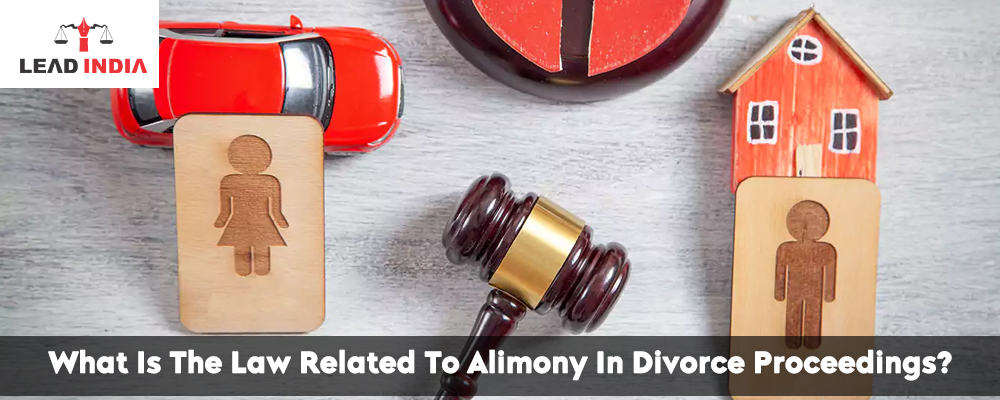The court, while deciding the divorce proceedings, also considers the alimony. The court decides the amount of alimony after considering various factors. The alimony plays a major role in divorce proceedings as it makes this proceeding smooth. The alimony can be granted interim, permanent, or both. Until that time, the order of permanent alimony is not passed; interim alimony is granted to the other spouse.
Law Related To Alimony In Divorce Proceedings
Hindu Marriage Act of 1955:
Section 24 of this Act talks about the interim maintenance. It does not talk about any specific formula for calculating the interim maintenance. The court considers various factors. These are: the time period of the marriage, financial condition of both the parties, the ability to earn of the other spouse, expenses related to education and health of children etc. Under this section, if the husband proves that he has no independent source of income, then he is also entitled to maintenance pendente lite. He must convince the court that he is unable to work due to his mental and physical condition.
Section 25 of this Act gives the idea regarding permanent alimony. This section talks about continuing alimony for granting a judgment of judicial separation, divorce or annulment of marriage. Under this, the court can order the respondent to pay to the applicant maintenance for a period consisting of the lifetime of the applicant.
Need A Legal Advice
The internet is not a lawyer and neither are you. Talk to a real lawyer about your legal issue

Hindu Maintenance and Adoption Act of 1955:
Section 18 of this Act gives the power to wife to claim financial support from husband in cases where the husband abandons the wife without any valid reason, if the husband has treated the wife with cruelty, if the husband has living second wife, if the husband maintains relationship with concubine, if the husband has converted to another religion and any other valid reason supporting the claim of husband living separately.
Muslim Women (Protection of Rights on Divorce) Act of 1986:
Section 3 and 4 talks about alimony. Section 3 of the Act entitles a divorced Muslim Women to a reasonable and fair maintenance amount from her ex-husband. This clause includes the amount of mahr or dower, which is decided at the time of marriage. Section 4 entitles a divorced Muslim woman to a monthly payment for support and maintenance throughout the period of Idaat. This Act recognizes the women’s right to fair and appropriate alimony to support themselves after the divorce.
Indian Divorce Act of 1869:
The people who profess Christianity can claim maintenance under this Act. Chapter IX of this Act provides the provisions for alimony. Section 36 states that the court has power to issue orders for spousal or child support during the course of divorce proceedings. The amount of maintenance and custody arrangement including visitation privileges will be decided by the court. Section 37 of the Act talks about alimony and maintenance that lasts a lifetime. The court has the power to order the payment of alimony to the wife. The court takes various factors into consideration while deciding the amount of maintenance like financial situation of both the parties, time period of marriage. The amount of alimony would be reduced if the petitioner was found to have committed a matrimonial offence. The court even ordered that the payment should be made in lump sum or in installments.
Parsi Marriage And Divorce Act of 1936:
In this Act, the wife can request both the alimony pendente lite and permanent alimony. The court might order the alimony up to 1/5th of husband’s net income. Section 39 and 40 deals with maintenance. The court takes into account the income and asset of both the parties, the parties conduct and other considerations while deciding the amount of maintenance.
Special Marriage Act of 1955:
This is a secular Act which provides the registration of inter – religion Marriages. Section 36 of the Act provides for interim alimony. If the district court finds that the wife does not earn enough money then the wife must apply to the court. Section 37 of the Act talks about permanent alimony. The court can order the husband to pay the alimony in the lump sum or in monthly installments to the wife. If it is found out that the wife has remarried or is not living chastely, then the court may alter, vary, revoke the orders of maintenance passed in favor of the wife.
BNSS:
Section 144 of BNSS talks about the maintenance. This secular provision applies to all the communities in India. The procedure of this section is summary in nature and apply to all people regardless of caste, creed and religion.
Alimony and maintenance regulations ensure that spouses and family members who cannot sustain themselves receive financial assistance. The provisions vary depending on the personal laws that apply to different communities. The courts evaluate a variety of issues when calculating maintenance amounts, with the goal of ensuring fair and adequate assistance.
For any legal help, contact lead India. We offer free online legal consultation as well as other legal services. On our platform, you can talk to lawyers. You can freely ask any legal question. We provide the solutions to your legal problems.





 Talk to a Lawyer
Talk to a Lawyer